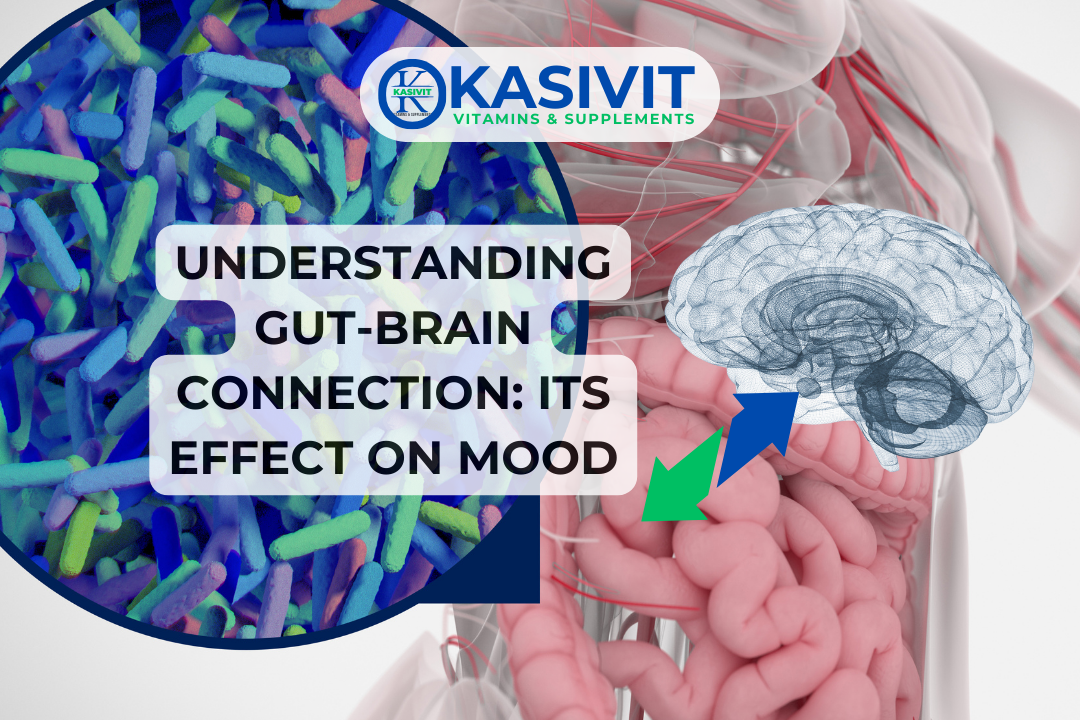
Understanding the Gut-Brain Connection: How Your Digestive Health Affects Your Mood
Adarsh GuptaShare
Gut-brain connection! What is that? Did you know that your gut and brain are in constant communication? This connection, known as the gut-brain axis, plays a crucial role in your overall well-being, including your mental health. The health of your digestive system can significantly impact your mood, and understanding this gut-brain connection is essential for maintaining a balanced mind and body.
The Gut-Brain Connection: A Two-Way Street
The gut-brain connection or axis is a bidirectional communication system that involves the central nervous system (CNS), the enteric nervous system (ENS), and the various pathways that connect them. The ENS, often referred to as the "second brain," is a complex network of neurons and neurotransmitters that regulate the digestive system's functions.
This intricate connection allows the gut and brain to exchange signals and information, influencing various aspects of our health, including mood, cognition, and behavior. Disruptions in this communication pathway can contribute to various mental health conditions, such as depression, anxiety, and stress-related disorders.
How Digestive Health Impacts Mood
The gut is home to a vast community of microorganisms, collectively known as the gut microbiome. These microbes play a crucial role in digestion, nutrient absorption, and immune function. However, their influence extends beyond the gut, affecting various aspects of our mental and emotional well-being.
1. Inflammation and the Brain:
Research highlights the intricate connection between gut inflammation and brain inflammation and how this relationship may influence mood disorders. Disturbances in the gastrointestinal tract, such as increased intestinal permeability and the presence of certain microbial residents, can impact mood and potentially contribute to conditions like depression (Bested et al., 2013). This connection between gut health and mental well-being underscores the importance of addressing gut inflammation to support a healthy gut-brain axis.
2. Neurotransmitter Production:
Neurotransmitters are chemical messengers in the brain that significantly impact mood regulation. Interestingly, neurotransmitters like serotonin (5-HT) and gamma-aminobutyric acid (GABA) are also produced by gut microbiota and play crucial roles in mood stabilization (Stopinska et al., 2021). Serotonin, often associated with feelings of well-being and happiness, is synthesized by certain gut bacteria, influencing its levels in the central nervous system (CNS). GABA, an inhibitory neurotransmitter, contributes to a calming effect on the brain and is also produced by specific gut bacteria. The balance of these neurotransmitters is essential for maintaining mood homeostasis, and disruptions in their production can lead to mood disorders. Thus, the gut-brain axis represents a complex communication network where gut microbiota-derived neurotransmitters can affect mood and emotional states.
3. Gut Permeability:
Increased intestinal permeability, often referred to as a "leaky gut," can allow harmful substances to enter the bloodstream, triggering an inflammatory response that may impact mood. Studies have drawn connections between marital distress, depression, and increased gut permeability (Kiecolt-Glaser et al., 2021). This condition allows bacterial endotoxin (lipopolysaccharide, LPS) to enter the bloodstream, leading to systemic inflammation. Research findings suggest that a leaky gut can contribute to brain inflammation and mood alterations, potentially fueling inflammation-related disorders.
Supporting a Healthy Gut-Brain Axis
Maintaining a healthy gut is essential for overall well-being, including mental health. One way to support a healthy gut-brain connection is through the use of probiotics, which are live beneficial bacteria that can help restore the balance of the gut microbiome. Several studies have shown that probiotics may positively impact mental health by reducing inflammation, modulating neurotransmitter levels, and improving gut barrier function (Wallace & Milev, 2017).
Gut Health Supplements
In addition to probiotics, various gut health supplements can support digestive wellness and potentially contribute to better mental health. These include:
1. Prebiotics:
Prebiotics are dietary fibers that serve as a food source for the beneficial bacteria in our gut. These indigestible fibers pass through the upper gastrointestinal tract and reach the colon undigested, where they are fermented by the gut bacteria. This fermentation process allows the beneficial bacteria to thrive and multiply, promoting a healthy gut microbiome. By promoting the growth of these beneficial bacteria, prebiotics contribute to improved gut health and overall well-being. (Ref: Bedu-Ferrari et al., 2022, Nutrients).
2. Digestive Enzymes:
Digestive enzymes play a crucial role in the breakdown and absorption of nutrients. These specialized proteins facilitate the chemical reactions that break down food into smaller, absorbable components such as sugars, amino acids, and fatty acids. Enzymes like amylase, protease, and lipase are involved in breaking down carbohydrates, proteins, and fats, respectively. As food travels through the digestive system, these enzymes are secreted at different stages to help ensure that nutrients are properly digested and absorbed. Essentially, digestive enzymes help the body access the nutritional value of the foods we eat, supporting overall health and well-being. (Ref: Ianiro et al., 2016, World Journal of Gastroenterology).
3. Omega-3 Fatty Acids:
Omega-3 fatty acids are known for their anti-inflammatory properties and their ability to help reduce gut inflammation. These essential fatty acids can modulate the immune response in the gut, potentially reducing the risk of inflammatory conditions. Moreover, omega-3 fatty acids play a crucial role in supporting brain health by promoting neuroplasticity and helping to maintain the integrity of cell membranes in the brain. Incorporating omega-3 fatty acids into the diet through sources like fatty fish, flaxseeds, and walnuts can contribute to a healthy gut-brain connection and overall well-being. (Ref: Canhada et al., 2018, Frontiers in Systems Neuroscience).
Maintaining a healthy gut is essential for overall well-being, including mental health. By understanding the gut-brain connection and incorporating probiotics, prebiotics, and other gut health supplements into your routine, you can support a balanced gut microbiome and potentially improve your mood and emotional well-being.
References
- Bested AC, Logan AC, Selhub EM. Intestinal microbiota, probiotics and mental health: from Metchnikoff to modern advances: part III - convergence toward clinical trials. Gut Pathog. 2013 Mar 16;5(1):4. doi: 10.1186/1757-4749-5-4. PMID: 23497650; PMCID: PMC3605358.
- Stopińska K, Radziwoń-Zaleska M, Domitrz I. The Microbiota-Gut-Brain Axis as a Key to Neuropsychiatric Disorders: A Mini Review. Journal of Clinical Medicine. 2021; 10(20):4640. https://doi.org/10.3390/jcm10204640
- Kiecolt-Glaser, Janice K., et al. "Marital distress, depression, and a leaky gut: translocation of bacterial endotoxin as a pathway to inflammation." Psychoneuroendocrinology 98 (2018): 52-60.
- Wallace CJK, Milev R. The effects of probiotics on depressive symptoms in humans: a systematic review. Ann Gen Psychiatry. 2017 Feb 20;16:14. doi: 10.1186/s12991-017-0138-2. Erratum in: Ann Gen Psychiatry. 2017 Mar 7;16:18. doi: 10.1186/s12991-017-0141-7. PMID: 28239408; PMCID: PMC5319175.
- Bedu-Ferrari C, Biscarrat P, Langella P, Cherbuy C. Prebiotics and the Human Gut Microbiota: From Breakdown Mechanisms to the Impact on Metabolic Health. Nutrients. 2022;14(10):2096. Published 2022 May 17. doi:10.3390/nu14102096
- Ianiro G, Pecere S, Giorgio V, Gasbarrini A, Cammarota G. Digestive Enzyme Supplementation in Gastrointestinal Diseases. Curr Drug Metab. 2016;17(2):187-193. doi:10.2174/138920021702160114150137
- Canhada S, Castro K, Perry IS, Luft VC. Omega-3 fatty acids' supplementation in Alzheimer's disease: A systematic review. Nutr Neurosci. 2018 Oct;21(8):529-538. doi: 10.1080/1028415X.2017.1321813. Epub 2017 May 3. PMID: 28466678.






